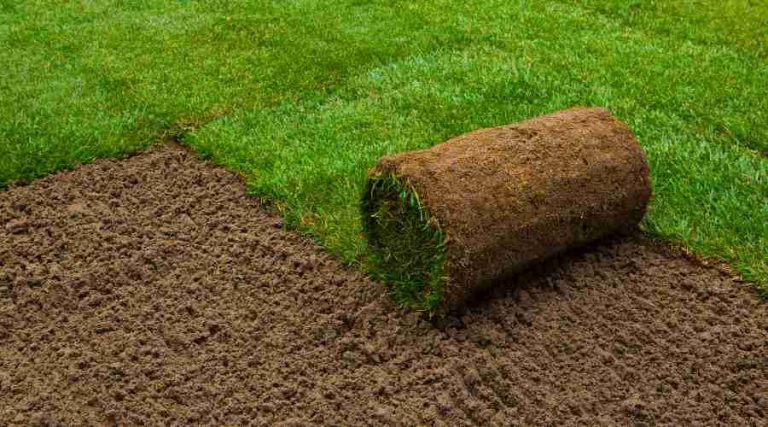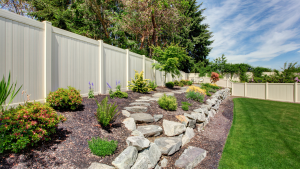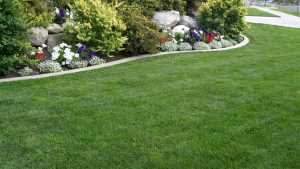An evaluation of the slope, the construction of terraces or retaining walls, the creation of contour swales, the use of mulch, the planting of ground cover, the installation of rain gardens, the consideration of hydroseeding, the use of drip irrigation, the installation of permeable surfaces, the use of proper watering techniques, and the improvement of soil quality are some methods for preventing runoff on sloped lawns.
It can be difficult to keep up a lush, healthy lawn, especially if your yard slopes. Runoff, which happens when water rushes downhill rather than being absorbed into the soil, is a frequent problem experienced by homeowners with sloped lawns. In addition to wasting water, runoff harms plants and causes soil erosion and nitrogen loss.
Fortunately, there are a number of practical methods you can use to stop runoff from sloped lawns and guarantee appropriate water management. We shall go into great detail about these tactics in this essay.
Review the Slope
Examine the slope of your grass before putting any protective measures in place. Using a level or a surveyor’s equipment, calculate the slope’s gradient. Runoff protection measures will need to be more intensive on steeper slopes. You can detect possible issue areas and develop appropriate remedies by having a basic understanding of the slope.
Place terraces or retaining walls.
To effectively control runoff on steep slopes, terracing is used. In order to slow the flow of water and avoid erosion, flat patches or steps are created along the slope. You can build retaining walls to keep back soil and direct water. These features not only make your lawn look better, but they also help to reduce runoff by offering practical support.
Construct contour swales.
Shallow depressions or trenches known as contour swales are used to collect and direct water following your slope’s contour lines. Contour swales work to retain moisture and stop runoff by rerouting water flow. In order to allow for efficient water absorption, it’s crucial to make sure the swales are graded correctly and have a gentle slope.
Apply mulch
On sloped lawns, adding a layer of organic mulch, such as wood chips or straw, can greatly reduce runoff. Mulch aids in water absorption and retention, enabling progressive soil penetration. Additionally, it helps to control soil temperature and minimizes soil erosion. For maximum impact, spread a thick layer of mulch over bare soil and around plants.
Groundcover plants
A great approach to stop runoff on sloped lawns is to plant ground cover vegetation. Select low-growing plants with extensive roots that can improve water absorption and stabilize the soil. Choose native species that can thrive in your area’s climate and soil. Additionally enhancing your landscape’s attractiveness and richness are groundcover plants.
Put in a rain garden
Rain gardens are specially made spaces that catch and absorb runoff from the rain. They are often placed where water naturally collects or at the bottom of slopes. To efficiently manage runoff, rain gardens include deeply rooted plants, porous soil, and appropriate drainage techniques. These gardens not only stop erosion but also provide a home for birds and beneficial insects.
Think about hydroseeding
Using the hydroseeding process, grass seed, mulch, and fertilizer are sprayed onto the soil’s surface. With this technique, the plant grows quickly and quickly establishes itself, helping to stabilize the soil and lessen runoff. For establishing plants on bare or disturbed slope slopes, hydroseeding is very helpful.
Put in a drip irrigation system
On sloped lawns, traditional sprinkler systems frequently cause runoff because the water is supplied too quickly and is not given enough time to absorb. Consider installing a drip irrigation system, which slowly and directly irrigates plant roots. Drip irrigation encourages water conservation, reduces runoff, and makes sure that water is distributed effectively.
Use proper irrigation methods.
It’s crucial to use the right irrigation methods while watering your grass to reduce runoff. Water your lawn in brief intervals, allowing the water to soak in before adding more. By using this method, extra water is kept from accumulating or evaporating. In order to maximize water absorption, irrigate your lawn in the early morning or late evening when evaporation is the least.
Adopt a Rainwater Harvesting Program
To decrease your dependency on public water supplies and limit runoff, think about collecting rainwater. Install cisterns or rain barrels to collect water that rains on roofs and other surfaces. During dry spells, you can utilize this gathered water to water your lawn and garden, eliminating the need for additional irrigation.
The Soil’s Quality
On sloped lawns, healthy soil is essential for preventing runoff. Regularly adding organic matter, such as compost or well-rotted manure, will improve the soil’s capacity to absorb water. These amendments strengthen the soil’s structure, boost its capacity to retain water and lessen runoff. To improve the soil’s ability to retain water, test the soil to identify its composition and pH levels and then add any necessary amendments.
Install porous surfacing
In locations where runoff is a recurring problem, such as driveways or pathways, take into consideration integrating permeable surfaces. Rainwater can seep into the ground using permeable pavers or gravel rather than building up and producing runoff. These surfaces aid in groundwater table replenishment and water absorption.
A healthy and sustainable landscape requires sloped lawns to be kept free of drainage. You may efficiently manage water flow, lessen soil erosion, and conserve water resources by putting the above-mentioned ideas into practice. Don’t forget to evaluate the slope of your lawn, build terraces or retaining walls if necessary, make contour swales, use mulch, plant ground cover, and think about hydroseeding or rain gardens.
Implement drip irrigation, use proper watering methods, and look into options for rainwater gathering. You may avoid runoff and maintain the health and beauty of your sloped lawn for many years by practicing proactive water management. However, employing a specialist like Baton Rogue Landscape Pros is a wise move because it ensures experience and specific knowledge, saves you time, and produces results of the highest caliber. Request more now!





